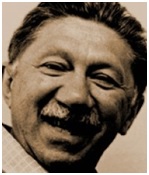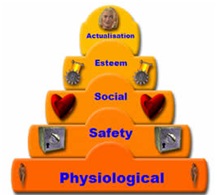|
 |
|
 |
|
|
||
Abraham Maslow - Humanistic Psychology and Hierarchy of
Needs
Abraham Maslow (1908-70)
American psychologist (pictured right). Famous for his Hierarchy of Needs (see point 1) Founder of humanistic psychology (see point 2).
His most famous book is... Motivation and Personality (1954).
What did he tell us?
1. Hierarchy of Needs
Everyone has five needs that are satisfied in this order:
Physiological Physical needs (food, water, air, sleep, sex and warmth).
Safety Physical and psychological security. Love (or Social) (including affection, friendship and belongingness).
Esteem
Self-actualization (at the top of the hierarchy)
Maslow didn’t say (as is sometimes thought) that a particular need will always be completely satisfied before you move on to the next one. Instead the average person’s satisfaction levels will decrease as he (or she) goes up the hierarchy. (from perhaps 85% for physiological needs to only 10% for self-actualization). Only unsatisfied needs can motivate you. 2. Humanistic psychology This believes that everyone has a strong desire for self-actualization through:
To achieve self-actualization you must:
3. Maslow’s Hammer He said, “If the only tool you have is a hammer, you tend to see every problem as a nail”. In other words. with inadequate training and knowledge of solutions, you opt for the most familiar solution, even though it isn’t the most effective.
Key quotes on motivation Man is a perpetually wanting animal. What a man can be, he must be. Gratified needs are not active motivators. Humans live by bread alone – when there is no bread.
Key quote on success One’s only failure is failing to live up to one’s possibilities.
Key quote on society The good society is one in which virtue pays. |
|
|
||
|
|
||
| Copyright © wisdomtowin.com 2025 All Rights Reserved | ||
|








